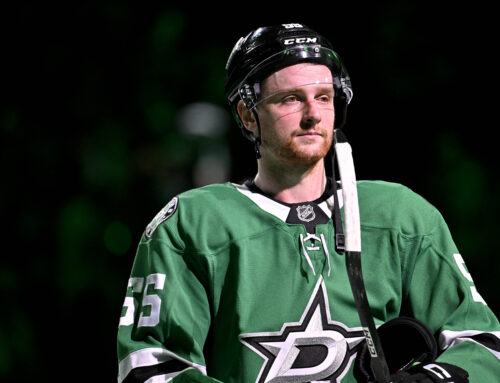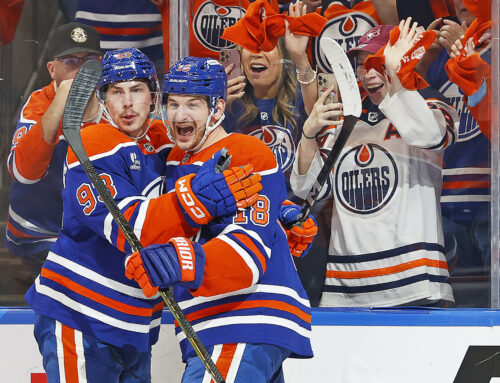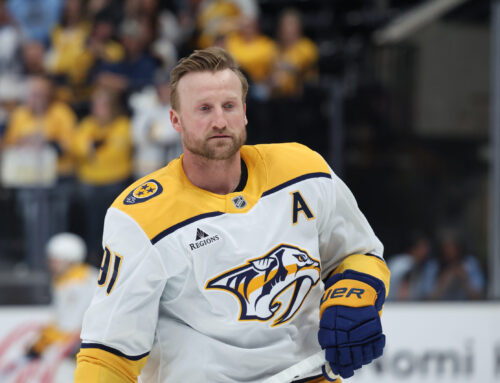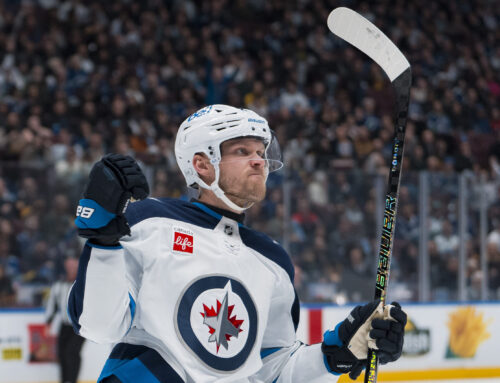We have all seen power rankings for teams that put teams in the order that they should be outside of actual points in the standings. I have my ratings for players that I've developed over the past few years, which give a player a game rating out of 10 based on a variety of stats during the game.
That rating can then give a player a rating for any period, whether a few games, a few months or a season. It can even be used historically for years past to see how players did over their careers. The rating can also be used to see how teams measure up as well in a variety of positions.
I've done the ratings for goalies for teams and skaters for teams before on my own, but this is the first time I've isolated team defence.
For NHL purposes the best defence in the league is Florida (6.504 rating) and the worst defence is in Buffalo (6.318). The league average is 6.403. This number holds for individual defencemen and team ratings. After doing this for a few years, I arbitrarily set the replacement level at around 6.25 for skaters.
As a result, I'm going to list the teams in the West from worst to best and see where they rank in the NHL and focus on some of the defencemen on each team and see how they stack up against each other.
Anaheim Ducks – 30th overall Defence (6.343)
At this moment, Kevin Shattenkirk (6.47) and Cam Fowler (6.45) have been the best Ducks' defenseman this season, with Jamie Drysdale (6.34) next. With Josh Manson (6.35) and Hampus Lindholm (6.45) being traded, the defensive depth is weak.
Drysdale should improve over the next one or two seasons, but you can see the lack of top-end talent that this team has is why they are where they are. They have iced Simon Benoit (6.23), Josh Mahura (6.23) and Andrej Sustr (6.17) for significant portions of this season.
San Jose Sharks – 28th overall (6.362)
There is no surprise that Brent Burns (6.59) and Erik Karlsson (6.52) are the best defenders on the Sharks still, followed by Mario Ferraro (6.40). After these three there is quite a drop-off in the level of play with Nicholas Meloche (6.27), Marc-Edouard Vlasic (6.24), Radim Simek (6.22) and Ryan Merkley (6.17) all at around replacement level.
I'm not sure how many more years the 37-year-old Burns can maintain this level or if Karlsson can duplicate what is somewhat of a comeback season for him.
Arizona Coyotes – 27th overall (6.367)
Jakob Chychrun (6.52) and Shayne Gostisbehere (6.50) anchor the Coyote’s blue line. After those two, there is quite a drop-off on defence as Arizona has given Dysin Mayo (6.37), Cam Dineen (6.34), J.J. Moser (6.31), Vladislav Kolyachonok (6.24) and Kyle Capobianco (6.23) an opportunity this season to grow. Victor Soderstrom (6.15) has played in 13 games this year and has been in a little over his head but there is still hope for the 21-year-old 11th overall pick from 2019.
Unless Soderstrom emerges next season, I'm not sure why the Coyotes would think about moving Chychrun because there isn't much else in the pipeline.
Seattle Kraken – 25th overall (6.379)
With Mark Giordano (6.48) sent to Toronto, the leaders on defence are now Carson Soucy (6.42), Vince Dunn (6.39), Adam Larsson (6.39) and Jamie Oleksiak (6.38). Of those four, Dunn has the most ceiling and could emerge as a 45-50 point defenceman in a year or two. Will Borgen (6.34) has a role opened up now and could emerge as an everyday player the rest of the season and into next year.
Haydn Fleury (6.35) might continue to struggle for an everyday role as he took a bit of a step back this season.
Vancouver Canucks – 21st overall (6.381)
Quinn Hughes (6.53) is probably a better player than the rating gives him credit for as there are parts to his game that can't be measured. He is the best defenceman on this roster without a doubt. He is followed by the surprising Luke Schenn (6.47), Tyler Myers (6.44) and Oliver Ekman-Larsson (6.43).
For Ekman-Larsson to make $10.5 million this season as just a slightly above average defenceman is a crime and just one of many mistakes Jim Benning made during his tenure.
The defence is rounded out by Brad Hunt (6.33), Tucker Poolman (6.31), Kyle Burroughs (6.29) and Travis Dermott (6.19). Dermott will be given some rope in Vancouver and will need to be better than he was in Toronto to become a regular next season. For the Canucks to improve next season they will need to improve their five through seven defenders.
Dallas Stars – 20th overall (6.382)
Lack of depth has hurt the backend this season. It is led by Miro Heiskanen (6.52), Esa Lindell (6.51), John Klingberg (6.48) and Ryan Suter (6.38).
Heiskanen has still to hit his offensive stride which we all expect, while Klingberg has struggled amidst the uncertainty of his future in Dallas for most of the season. Suter is not the player he was at the age of 37 and is signed for three more years at $3.65 million AAV. Jani Hakanpaa (6.33) has been a bit of a disappointment, while Thomas Harley (6.20) just needs more time.
Los Angeles Kings – 19th overall (6.383)
As long as Drew Doughty (6.67) is with the Kings, he will more than likely be at the top of the list. He's been well supported by Matt Roy (6.52), Sean Durzi (6.47) and Alexander Edler (6.47) this season when they have all been in the lineup together.
Mikey Anderson (6.31) has held his own when Doughty has been out of the lineup (33 games), while Olli Maatta (6.31) has been a little better than last season. Ideally, Tobias Bjornfot (6.19) would not be in the lineup for all 67 games that he has been in, but at 21-years of age at least he is in the NHL and gaining experience.
Durzi has been impressive on the power play for the Kings in his rookie season, but the opportunities will be limited when Doughty is healthy. He needs to be a little better at 5 on 5.
St. Louis Blues – 18th overall (6.39)
On the surface, I thought the Blues would be higher than this. They have a very solid top-three of Justin Faulk (6.60), Torey Krug (6.52) and Colton Parayko (6.52), but struggle a little down the line.
The rest of the defence consists of Niko Mikkola (6.34), Marco Scandella (6.32), Robert Bortuzzo (6.24) and Nick Leddy (6.23). If Leddy isn't producing offence he is a liability, so I was a little surprised that the Blues spent a 2nd round pick to get him.
Scott Perunovich (6.24) played 19 games and is out for the season after wrist surgery in March. He should be a regular next season.
Chicago Blackhawks – 17th overall (6.394)
Chicago brought in Seth Jones (6.63) to be the leader on defence and he has come in and done that for the most part. He is on pace for 58 points, which would exceed his career-high of 57 that he had in Columbus in 2017-18. He is complemented by a pretty physical defence that includes Connor Murphy (6.43) who has 130 hits and 150 blocked shots, Calvin De Haan (6.42) 135 hits, 163 blocks, Jake McCabe (6.40) 139 hits, 143 blocks, his brother Caleb Jones (6.34) 71 hits, 52 blocks and Riley Stillman (6.32) 101 hits, 50 blocks.
Erik Gustafsson (6.31) is a former 60-point defenceman (while with Chicago in 2018-19) who has struggled to find a regular role since in Calgary, Philadelphia, Montreal and back with Chicago. The team will hope that Ian Mitchell (6.13) is ready next season as De Haan and Gustafsson are unrestricted free agents at the end of the season.
Minnesota Wild – 12th overall (6.415)
The separation between Minnesota and Chicago above isn't that great, but we start to see a little more balance and depth with the Wild.
The defence is led by Matt Dumba (6.54), Jared Spurgeon (6.54), Jonas Brodin (6.48) and Alex Goligoski (6.46), which is as good a top-four as most teams can hope for.
The club traded for Jacob Middleton (6.38) in addition to having Jon Merrill (6.35) and Dmitry Kulikov (6.33) which improves their depth immensely for the playoffs.
Nashville Predators – 9th overall (6.428)
When you arguably have the number one defenceman in the NHL, with Roman Josi (6.94) your defence is going to be better than most. The Predators used to be the envy of the league as little as three or four years ago but have had to move a number of defencemen out, including Ryan Ellis (6.74).
The good news is that Alexandre Carrier (6.45) has had an excellent under-the-radar rookie season and has pulled ahead of Dante Fabbro (6.41) in terms of development. Mattias Ekholm (6.45) re-signed for $6.25 million AAV over the next four years but has probably seen his best hockey in the past.
The team hopes that Jeremy Lauzon (6.31) who was acquired from Seattle can come in and provide some much-needed physicality into the lineup. Mark Borowiecki (6.29) and Matt Benning (6.25) do what they can with 13-16 minutes per night but are stretched when faced with playing any more than that. Philippe Myers (6.27) was a disappointment and actually cleared waivers.
Winnipeg Jets – 8th overall (6.431)
The Jet’s defence has been in disarray since Dustin Byfuglien stopped playing. This season marks a turnaround for this group as it is led by Josh Morrissey (6.52) and Neal Pionk (6.51).
The additions of Brenden Dillon (6.42) and Nate Schmidt (6.42) have upgraded the depth to go along with Logan Stanley (6.42) continuing to improve. Dylan Demelo (6.31) has held his own, but the emerging Ville Heinola (6.39 in 12 games) should get some time down the stretch and be a regular next season.
Edmonton Oilers – 7th overall (6.433)
The defence has been one of the Achilles heels of the Oilers for the past five or six seasons. This season marks a contrast in that this group has played fairly well with goaltending a bigger issue this year.
Darnell Nurse (6.69) is the key to this defence and even though he has his detractors, this team wouldn't be the same without him. Evan Bouchard (6.52) has emerged in his rookie season and at times has replaced Tyson Barrie (6.48) as the quarterback on the first unit of the powerplay.
Cody Ceci (6.44) and Duncan Keith (6.40) have been better than I thought they would be. If Kris Russell (6.41) is healthy he's an important piece, with newcomer Brett Kulak (6.29) adding a much-needed upgrade for the Oilers at the 6th or 7th defender position.
Colorado Avalanche – 4th overall (6.453)
I don't think there is another team with a one-two combination on defence like Colorado has in Cale Makar (6.87) and Devon Toews (6.74). Both of these guys are in the top-10 in the NHL, which is an embarrassment of riches for the Avalanche.
Erik Johnson (6.49) has had a great comeback year while averaging just over 17 minutes per night while Samuel Girard (6.41) has had a bit of a step back from last season. Newcomer Josh Manson (6.35) is a substantial upgrade on Jack Johnson (6.24), Ryan Murray (6.21) or Kurtis MacDermid (6.19).
Bowen Byram (6.49) is a lock as a regular next season if not the playoffs this year if he is healthy.
Calgary Flames – 3rd overall (6.454)
It is hard to believe that defence with Nikita Zadorov (6.36) and Erik Gudbranson (6.40) would be one of the top back ends in the NHL, but here we are.
The team is led by Rasmus Andersson (6.55), Noah Hanifin (6.51), Oliver Kylington (6.46) and Chris Tanev (6.42). A rating like mine doesn't do justice to a player like Tanev, who makes everyone he plays with better.
Michael Stone is back and healthy and will provide depth at the 6th or 7th position, while Juuso Valimaki (6.34) is knocking at the door for next season.
Vegas Golden Knights – 2nd overall (6.489)
With Alex Pietrangelo (6.66) and Shea Theodore (6.54), the Golden Knights possess two excellent defenseman. This team has sorely missed Alec Martinez (6.48) and is happy to have him back. Zack Whitecloud (6.51) has had a solid season, along with Brayden McNabb (6.46) and Nicolas Hague (6.46). Ben Hutton (6.34) was added as depth and in an ideal world will be the 7th defenceman.
If Vegas gets healthy and gets back Mark Stone and Max Pacioretty, this is an under-the-radar team that can make another deep run.
Thanks for reading, and let me know if you want me to focus on any players or topics by messaging me below or following me on Twitter @gampbler15.





 EDM
EDM FLA
FLA MIN
MIN NYR
NYR L.A
L.A DAL
DAL BUF
BUF CBJ
CBJ DET
DET VAN
VAN WPG
WPG
